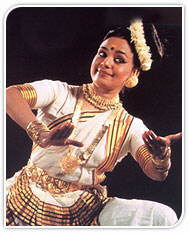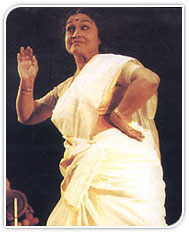Dances of India: Mohniattam
 Mohni
Attam is one of the youngest Indian Classical dances. It was by about 16th
Century A.D. that this dance form was known from and in the 19th Century
Maharaja Swati Tirunal of Trivandrum encouraged this art form and
stabilized it.
Mohni
Attam is one of the youngest Indian Classical dances. It was by about 16th
Century A.D. that this dance form was known from and in the 19th Century
Maharaja Swati Tirunal of Trivandrum encouraged this art form and
stabilized it.
Mohini means a maiden who excites desire and her
dance is known as Mohini Attam.
From the inception itself,
Mohini Attam was conceived as a form of social diversion The themes of the
songs were both religious and social.
In the matter of technical
format, there are many similarities between Mohini Attam and Bharat Natyam
and also the central motif of adavus being the same is essentially a solo
dance and performed by women with tender and graceful body movements
belonging to the lasya style.
 The
hand gestures play an important part as a communication medium. The
costume comprises a white sari with gold or red border accompanied by gold
ornaments on the neck, waist, wrists and a typical hair-bun with white
flowers on the left side of the head.
The
hand gestures play an important part as a communication medium. The
costume comprises a white sari with gold or red border accompanied by gold
ornaments on the neck, waist, wrists and a typical hair-bun with white
flowers on the left side of the head.
The dominant emotion in
Mohani Attam is also shrinagara or love.
 Mohni
Attam is one of the youngest Indian Classical dances. It was by about 16th
Century A.D. that this dance form was known from and in the 19th Century
Maharaja Swati Tirunal of Trivandrum encouraged this art form and
stabilized it.
Mohni
Attam is one of the youngest Indian Classical dances. It was by about 16th
Century A.D. that this dance form was known from and in the 19th Century
Maharaja Swati Tirunal of Trivandrum encouraged this art form and
stabilized it.  The
hand gestures play an important part as a communication medium. The
costume comprises a white sari with gold or red border accompanied by gold
ornaments on the neck, waist, wrists and a typical hair-bun with white
flowers on the left side of the head.
The
hand gestures play an important part as a communication medium. The
costume comprises a white sari with gold or red border accompanied by gold
ornaments on the neck, waist, wrists and a typical hair-bun with white
flowers on the left side of the head.